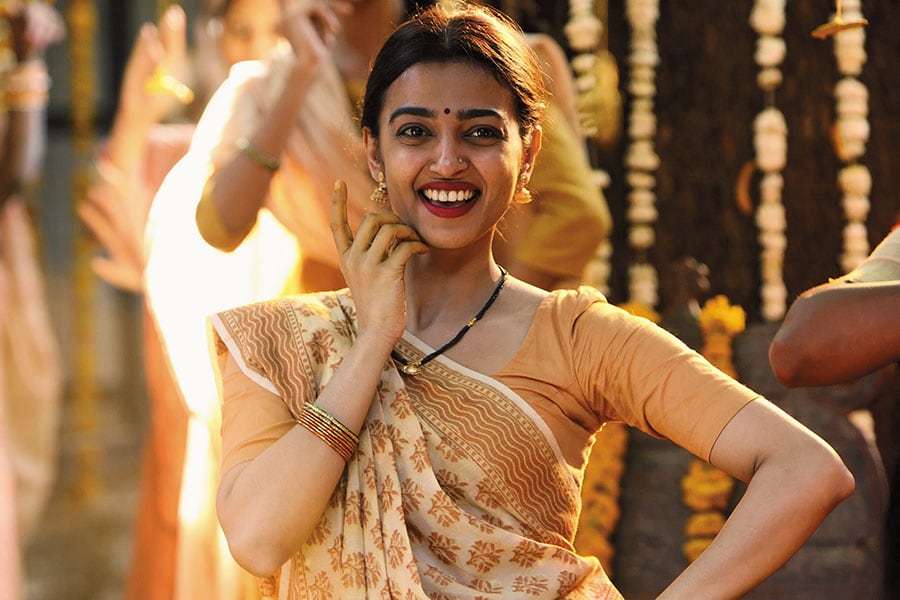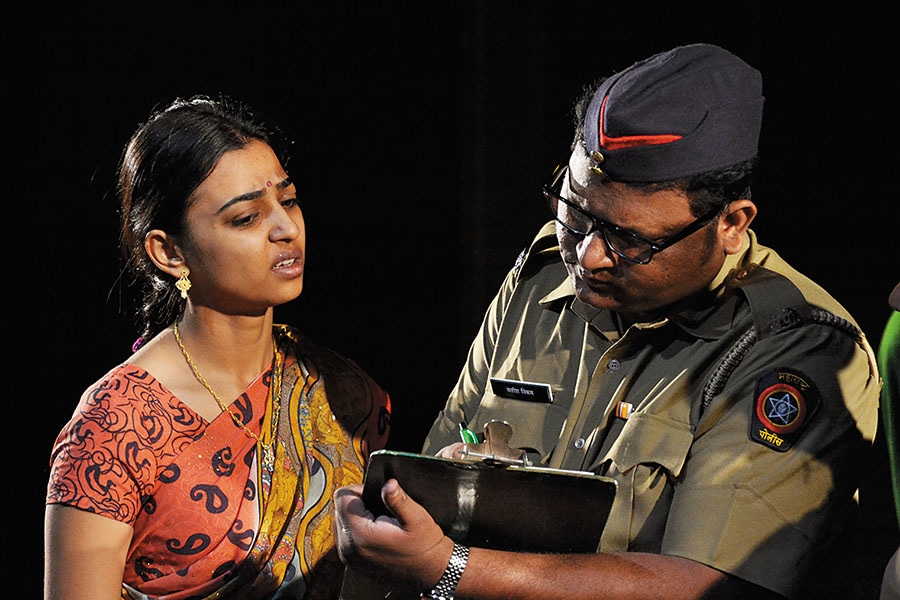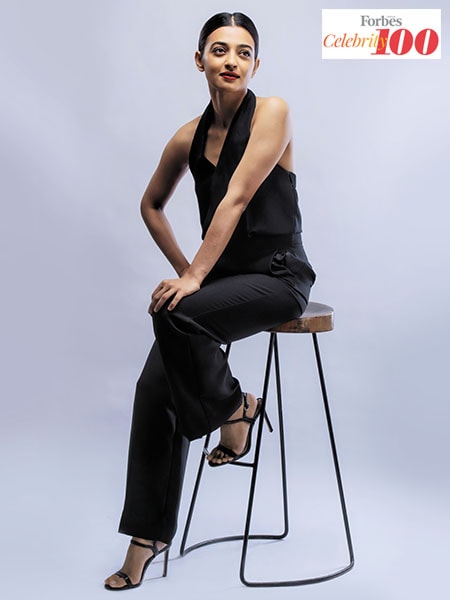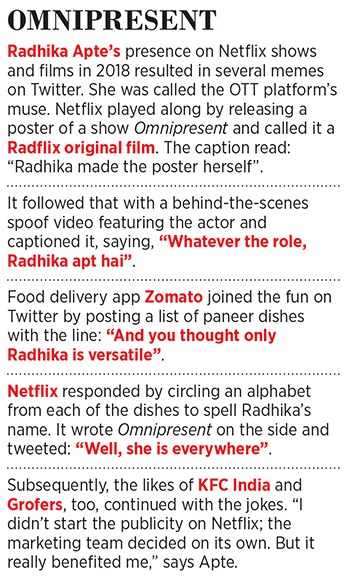Radhika Apte: Radical and apt
With six releases across multiple platforms, the Sacred Games actor can call 2018 her own. Now, the challenge is to sustain herself in the mainstream


In 2007, Radhika Apte, then 22, was in a tight embrace with co-actor Ashish Mehta when the curtains opened for Tu, a play staged in Latur, in the interiors of Maharashtra. The crowd at the venue, probably unaccustomed to such physical proximity in public view, began whistling and hooting, with some even flashing laser lights on the actors.
Director Mohit Takalkar sensed the acute discomfort it had caused to his actors and rushed to the wings to pacify them. “It [the crowd behaviour] was insulting. Radhika’s eyes had turned moist. I waved my hand to calm her down and told her to continue,” recalls Takalkar, founder of Aasakta Kalamanch, a non-profit theatre organisation in Pune. “Once she left Ashish’s arms, she just glided on the floor, as if to suggest, ‘Now the stage is mine. Nobody needs to do anything’.”
This ability to own the stage and have a sense of oneness with the medium has been an invaluable asset throughout Apte’s journey as an actor. And 2018, in particular, has brought that to the fore to a wider audience. She had six releases this year: From commercial movies like Pad Man, Andhadhun and Baazaar to Netflix originals Sacred Games, Ghoul and Lust Stories.
Apte, now 33, has chosen a path less trodden than the one aspiring actors usually take. Some of her early films were in regional languages: Gho Mala Asla Hava and Samaantar in Marathi and Antaheen in Bengali, all 2009 releases. Subsequently, her filmography consists of a host of independent or niche movies like Parched (2016) and Phobia (2016) interspersed with mainstream ones such as Badlapur (2015) and online releases, which includes the short film Ahalya (2015).
“Ever since I remember, I wanted to be an actor,” says Apte, who studied in the Marathi-medium Aksharnandan School in Pune. “When I was in school, I wanted to be a Bollywood actor because your exposure is only limited to that… at least mine was. Once I got exposed to theatre, I wanted to be a theatre actor. Later, when I was introduced to world cinema, I wanted to be an actor there. So it changed over a period of time.”
Her doctor parents—father a neurosurgeon and mother an anaesthetist—wanted her to have a Plan B, so she took up science in college, but quit after a year and opted for arts, because she was hell bent on acting. Eventually, she graduated in economics and mathematics from Pune’s Fergusson College.
In college, she spent less time in the classroom and more on stage. During that time, she had enrolled with Aasakta and was doing workshops with thespians like Satyadev Dubey and Vijaya Mehta. While Apte imbibed the nuances of acting by watching luminaries on stage and evolved by studying her own performances, directors Sumitra Bhave and Sunil Sukthankar offered her Gho Mala Asla Hava. “They were involved with our theatre group and I had seen a lot of their work. They are one of my favourite filmmakers. Their scripts are extremely good. Plus I speak Marathi, so it was a no-brainer,” says Apte. Actor Rahul Bose saw her in a play, Bombay Black, around the same time and recommended her to Aniruddha Roy Chowdhury, who cast her in Antaheen.
Chowdhury was on the lookout for a big name as his previous film, Anuranan (2006), had won a National Award [for Best Feature Film in Bengali]. He decided to meet Apte nevertheless. “She was eating spaghetti at a small Italian joint in Oshiwara, Mumbai, when I walked in. The moment I saw her I knew she was Brinda [the character of an investigative TV journalist]. I hadn’t seen her photos or her work. I had no idea about how she looked till then. I can’t tell you why and when I felt like that. That is called sixth sense,” says Chowdhury. Antaheen also bagged a National Award [for Best Feature Film].
Apte earned considerable praise for her performances in the two regional films, but a mainstream break was still elusive. “Just coming to Mumbai was difficult. I didn’t know any casting director… it didn’t happen, so it was quite frustrating,” she says about her early days. Pad Man director R Balki says he wrote the script with Radhika Apte in mind During one of her later visits to the city to act in theatre, a couple of casting directors saw her in a play, Purnaviram, and offered her two films, Rakht Charitra (2010) and Shor In The City (2011), but the films didn’t make much of a mark. However, even before she entertained thoughts of a stable career, she went to study dance at London’s Trinity Labon Conservatoire of Music and Dance for a year before returning to Pune and spending a year there.
Pad Man director R Balki says he wrote the script with Radhika Apte in mind During one of her later visits to the city to act in theatre, a couple of casting directors saw her in a play, Purnaviram, and offered her two films, Rakht Charitra (2010) and Shor In The City (2011), but the films didn’t make much of a mark. However, even before she entertained thoughts of a stable career, she went to study dance at London’s Trinity Labon Conservatoire of Music and Dance for a year before returning to Pune and spending a year there.
She finally moved to Mumbai in 2013 to break into the mainstream. But despite a prolific 2018, she believes she hasn’t achieved it yet. “It’s still quite tough. They [the industry] have a different criteria and I didn’t have certain things. I still don’t. So, it’s taken a while. I was typecast as something else. Even today, I don’t know how to sustain the mainstream space or keep getting those parts. I don’t know if it’s a fluke that I got these films. Only time will tell,” she says.
She’s perhaps being too harsh. Pad Man director R Balki, for example, says he wrote the script with Apte in mind. “I have seen a lot of her work and am a great fan of hers. I don’t think there’s a more complete actor than her. When you have talent like that and professionalism to go with it, it’s a lethal combination,” says Balki, adding that when he watched the Rajinikanth-starrer Kabali (2016), he saw Apte for most of the time and not the mega star.
*****
While Apte was trying to strike a balance between content-driven, niche and commercial films, storytelling itself underwent a change. The web became a powerful medium and the proliferation of OTT platforms proved to be a boon to actors like her. “It’s a great platform because your visibility is multifold. You are viewed all over the world. Also, because content is competing with world content, there is a different bracket you are trying to reach. You are trying to up your game in a different way. And there are fewer compromises in terms of content,” says Apte, who is itching to do more work in this space.
Her eclectic choices and versatility have impressed her peers too. “I call her ‘Radical Apte’ because her choices are radical. She is a breath of fresh air because she is so real in this industry. She believes in her core values. That’s why she is respected… because of her choices, because of the person that she is,” says her Andhadhun co-actor Ayushmann Khurrana.
But despite the accolades and the generous words of praise, Apte can’t say for sure if she’s been accepted by the industry. “It’s a better acceptance for sure… call me cynical, but I would like to see what is going to happen. I wouldn’t make a statement about my place right now. I definitely want to do far more this is not even the beginning. I have done good projects, but I would like to go to work every day. Not work for 10 days in a film that is shot over 80 days,” says Apte.
Filmmakers, though, can’t wait to work with her again. “Radhika is any director’s delight. She is doing so much work and has become a household name. She is not conventional and yet she has reached there. People look forward to her performances,” says Chowdhury, who also directed the acclaimed 2016 film Pink. He fondly remembers the effort she put to learn Bengali for Antaheen. “She was brilliant. Radhika is a pure, spontaneous actor. She is extremely obedient, graceful and receptive.”
Takalkar recalls spotting her during a workshop conducted by Vijaya Mehta in 2000-01 where she was an observer. He asked Apte if she would like to act in his play Brain Surgeon. “The next day she was at our rehearsal hall 20 minutes before time,” he says. At Aasakta, she did multiple plays, including Matra Ratra, Purnaviram and Garbo. “She did not shy away from anything that we were doing. If you suggested that we could do a scene in a certain way, she would try it the next moment. Not once did she say she was tired or bored. And she did everything with high intensity. Even her rehearsals were not done in a half-hearted manner. She did exactly the same at the rehearsals that she would do on stage,” says Takalkar.
***** Apte in Aasakta’s theatre production Uney Purey Shahar Ek Theatre remains dear to Apte even today, but she does not have the time for it. “Right now, I am prioritising films. But there will be a time when I’ll be able to do both,” she hopes. Paucity of time is a pressing problem, especially since her popularity skyrocketed in the last year. She has barely slept the night before the photo shoot for Forbes India and is relying on a large cup of coffee to keep her going. Besides, she has to rush for a meeting with a top producer immediately after. She’s glad that she’s busy, but has also learnt to say no without feeling insecure: “Insecurity is not only when you don’t have work… you also feel insecure when you get work how to maintain that work.”
Apte in Aasakta’s theatre production Uney Purey Shahar Ek Theatre remains dear to Apte even today, but she does not have the time for it. “Right now, I am prioritising films. But there will be a time when I’ll be able to do both,” she hopes. Paucity of time is a pressing problem, especially since her popularity skyrocketed in the last year. She has barely slept the night before the photo shoot for Forbes India and is relying on a large cup of coffee to keep her going. Besides, she has to rush for a meeting with a top producer immediately after. She’s glad that she’s busy, but has also learnt to say no without feeling insecure: “Insecurity is not only when you don’t have work… you also feel insecure when you get work how to maintain that work.”
Takalkar has seen all of Apte’s films, but believes she hasn’t even showcased 40 percent of her potential. “I hope she gets complex roles a lot of what she has been doing have been one-dimensional ones. She can hold the complexity of a character her forte is to show the other side of a character,” he says.
Apte is likely to be ready for that challenge too as she prefers to surrender herself to the director. The problem, she adds, arises when the wavelengths don’t match. “But I try to do what the directors want… it’s good to go their way because then you are breaking away from your comfort zone. You are trying to do something that you are not comfortable with. That’s the whole point of it [acting] as well,” she says.
So far, she has lived life on her own terms. She does not expect that to change. “I get suffocated if I do anything against my wish,” explains Apte.
Those who know the actor well say she’s a complex person. “Nobody can know instantly what she is. I think there is a lot that she has kept reserved. She is extremely moody. She feels one thing and conquers that the next moment she breaks down. You can’t say one thing about Radhika,” says Takalkar.
What one can state with certainty is that she enjoys travelling. And she loves to read, watch films, meet new people, eat and cook. Having been brought up comfortably, Apte does not have “crazy needs”. In fact, she does not even shop for clothes. Sometimes, by her own admission, when a stylist brings clothes for a shoot, she asks if she could buy them.
Acting gives her an ultimate high. She remembers a surreal moment while shooting a scene for Gho Mala Asla Hava with a moving camera on a trolley. “The camera and me, our intimacy was so comfortable that I could feel whatever I wanted to and let the camera into my personal space. I felt extremely secure with the camera. That’s when I decided to be a film actor. It was like my best friend,” she says.
And that friendship continues.
First Published: Dec 10, 2018, 11:24
Subscribe Now
